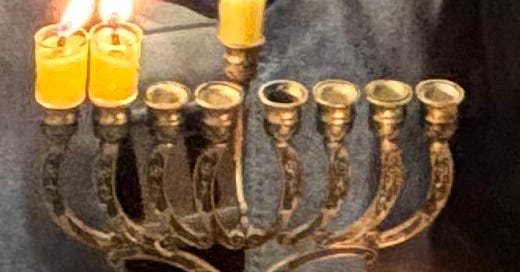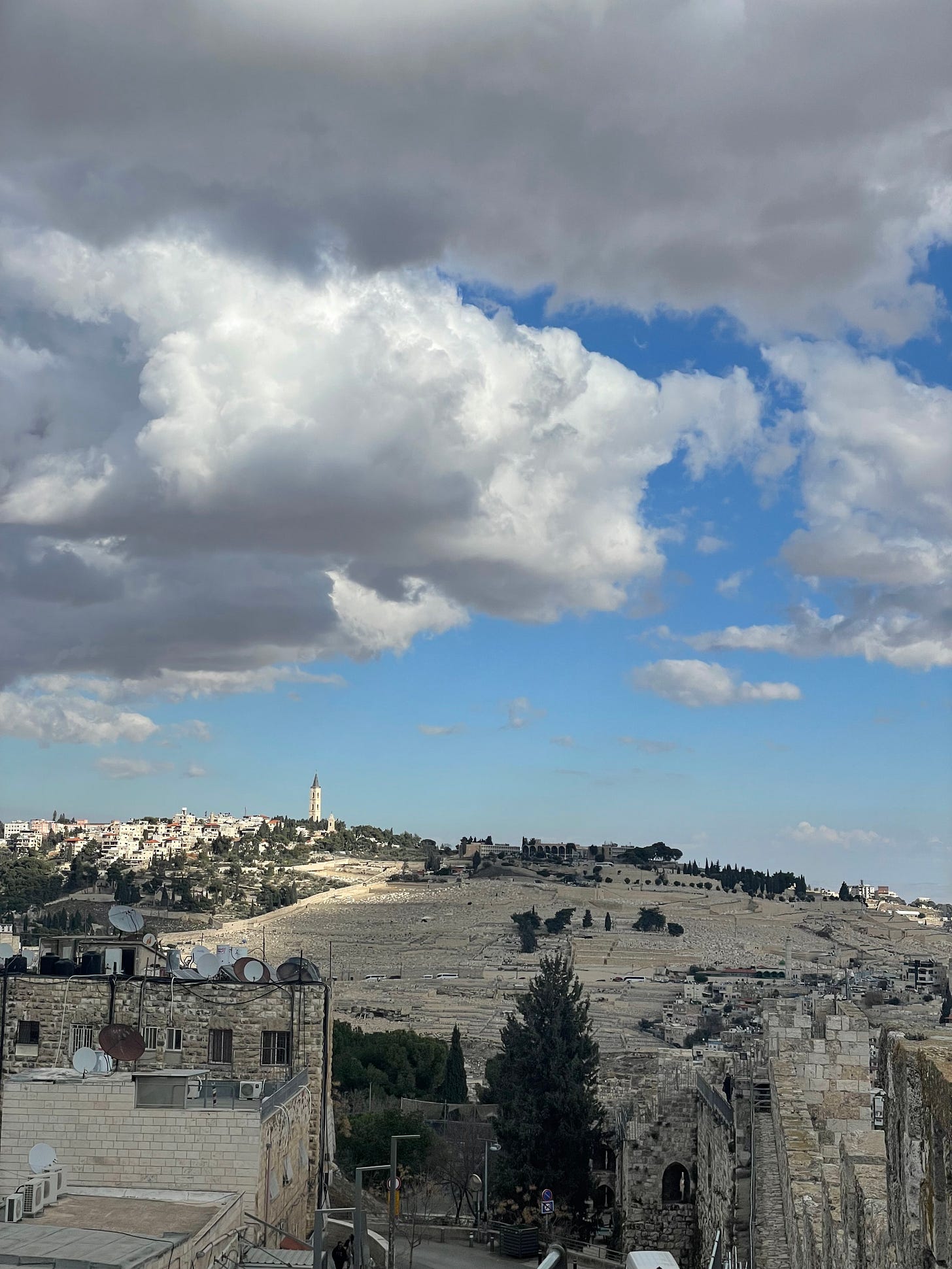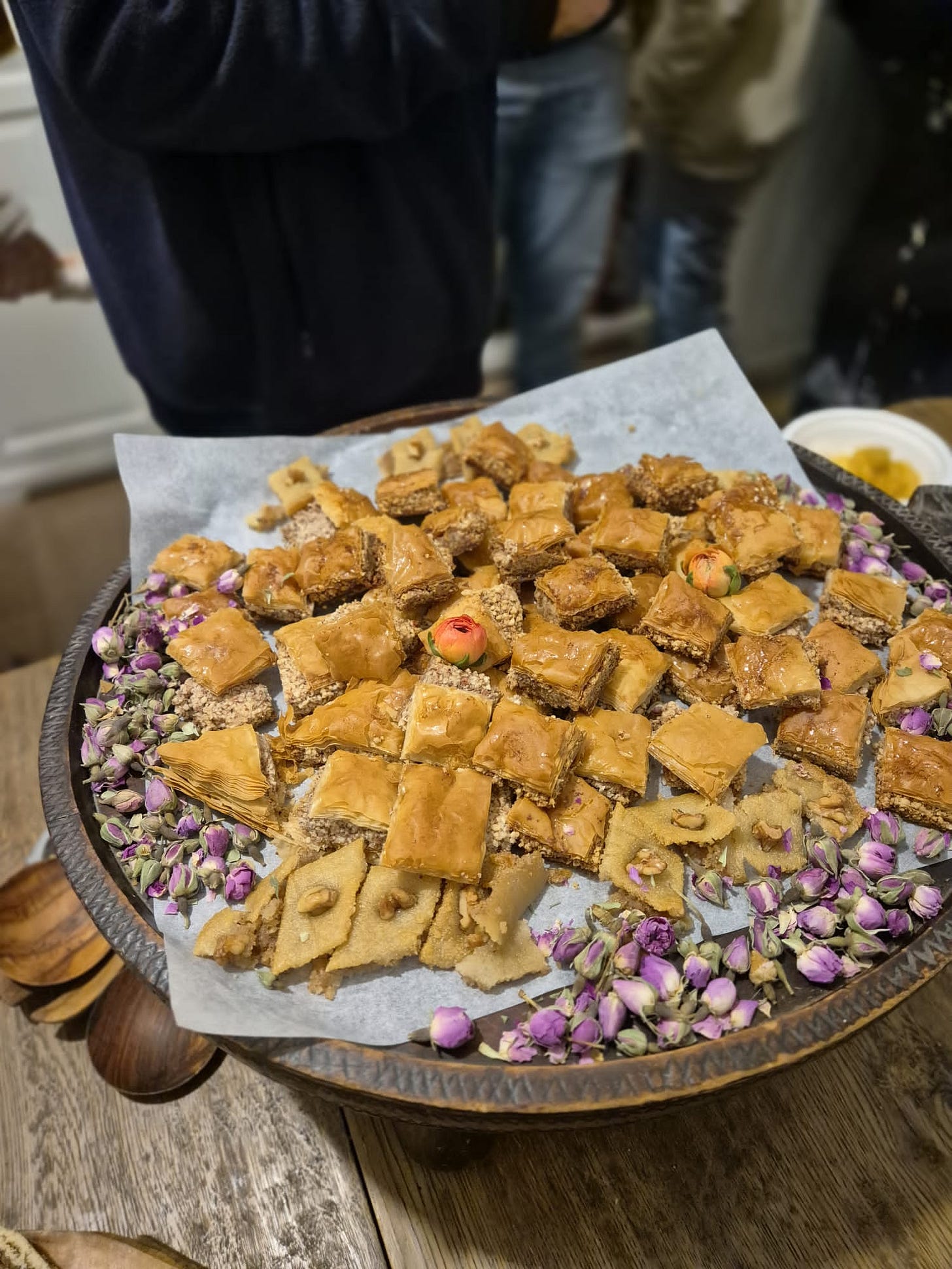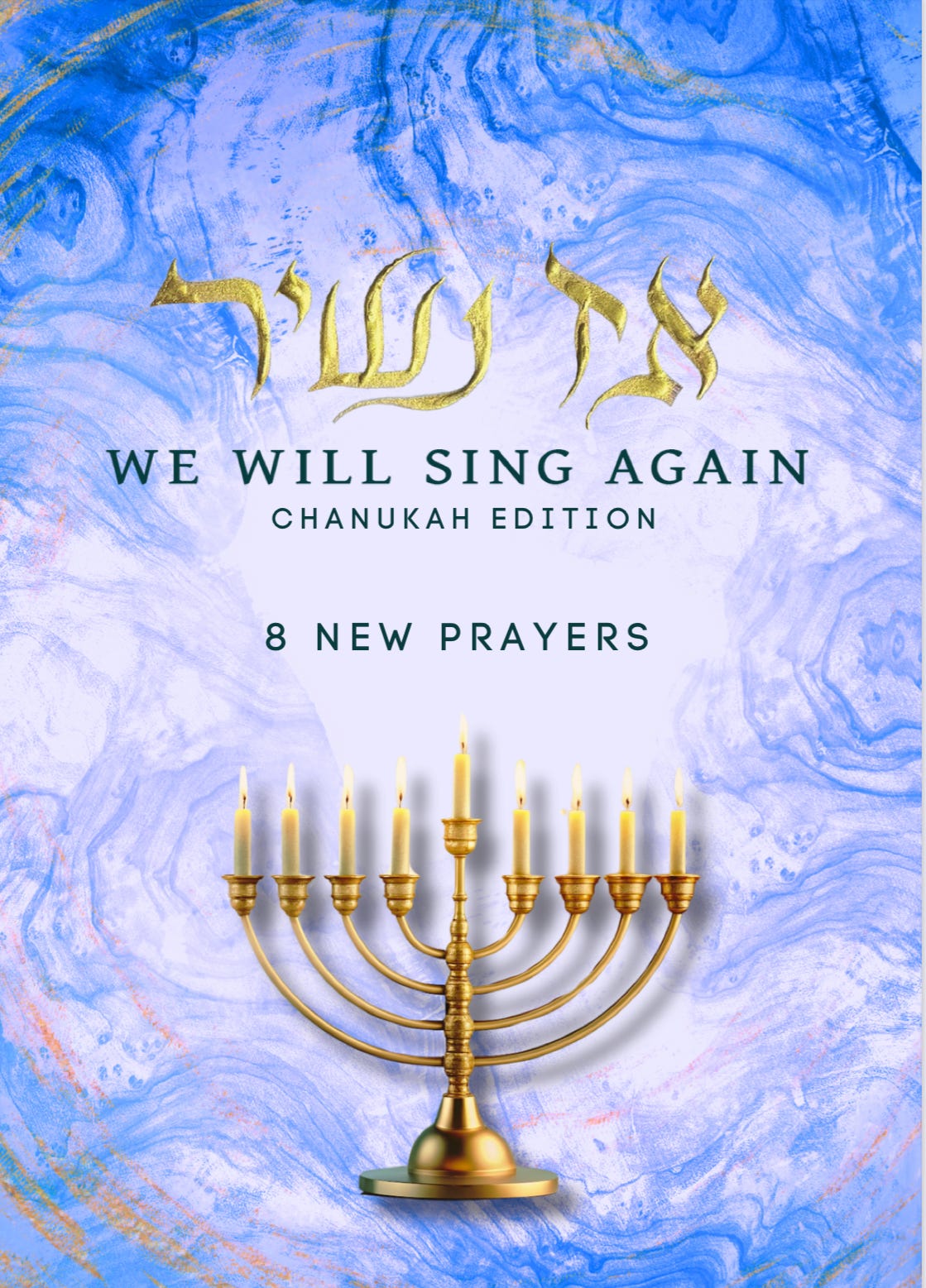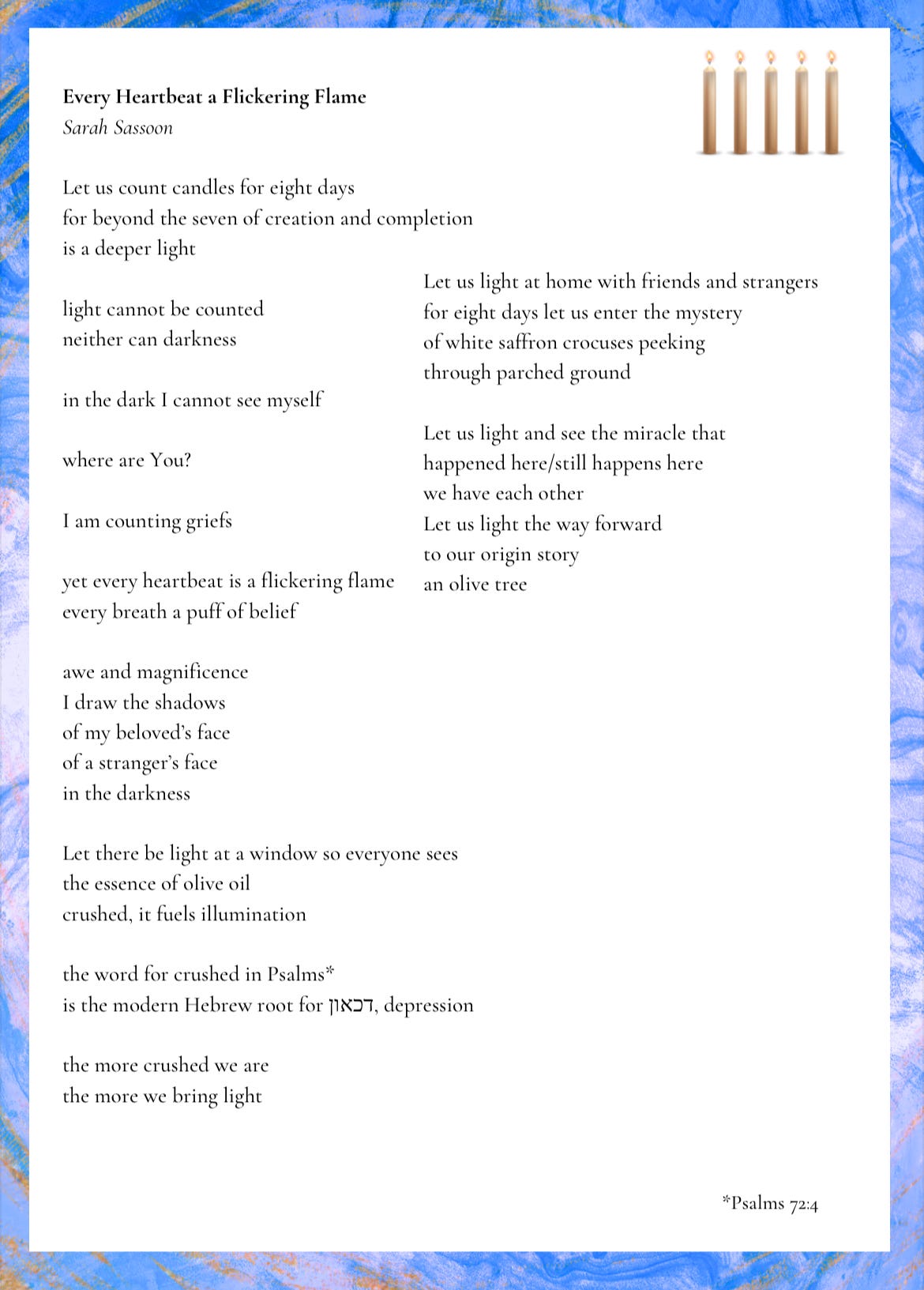A friend messages me for my pavlova recipe. For the life of me I don’t have it written down. Often when I cook I look up recipes I have shared to check if I’m adding the right amount of sugar and egg whites. I scroll to find whom I shared my pavlova recipe with last, and share it on. Every recipe I share I preserve.
We keep what we share.
This had me thinking, how much do I share? How much do I keep through my sharing? And I thought to share some thoughts…
This has been a year of much sharing. We have shared our grief, because that is war. We have shared our fear, because that is how it is when thousands of rockets are lobbed from Gaza, Iran, Lebanon, Iraq and Yemen. We have shared our joy and light, our faith and resilience — all we love, all we are grateful for. We have shared our miracles, the fact we are still here. We have kept each other.
But not everyone is here anymore.
We share so much grief on the streets of Jerusalem. Yesterday was the funeral of Yuval Shoham, a 22-year-old Staff Sgt. killed in an operational accident in Gaza. A dear friend of Hersh Goldberg-Polin, who shouted Hersh’s name on the streets of Gaza, desperate to find him when he was still a hostage, before Hersh’s execution. The streets were lined with people holding flags silently awaiting the convoy of tragedy that would be winding its way from Baka to bury Yuval at the military cemetery on Mount Herzl. May his memory be a blessing.
We keep what we share. May Yuval Shoham’s memory be shared.
This year we have shared stories. I’ve interviewed, recorded and posted the stories and traditions and inspiration of many Iraqi Jews, displaced Israelis and October 7th survivors. I’ve also been running writing workshops and attended many too. I have been humbled by the stories I’ve heard, the discoveries of self and life found through putting pen to paper. Memories from parents meeting in displaced person camps, to Sunday family roasts, family heirlooms and lost sons. There was tears held together, belly laughter and the gasps of surprise. We don’t really know our stories until we write them down. Until we share them.
We keep what we share. Stories written and witnessed - shared across screens, hearts, continents.
This has been a year of birthing dreams as so much has died around us. This is the year my dream of a free Middle East felt possible to articulate and share. As ideologies and slogans of hate and dehumanization spread I have thought to ask why is that more valid than my dreams of coexistence, where Jews and minorities can be safe in the Middle East again. Where women and girls can freely access education, self-agency and safety in their homes and societies. Where extreme ideologies do not steal joy and free choice.
I question journalists and academics who tell me it’s not possible. Where 15% of the population are Jihadi Islamic extremists, one journalist tells me, they take over, be it in Lebanon, Birmingham England, Baghdad, and there’s nothing that can be done.
How about the silent majority? I ask. How about the average, every day person who just wants to put bread on the table? I think of my dear friend in Baghdad who is Muslim, who dreams of freedom from Iran, and democracy which respects his deep cultural family values at the same time. Who wants to restore Iraq to what it was in the 20’s and 30’s when life was coexistent with Jews, prosperous and full of possibilities, before Pan-Arab nationalism took over. I think of the Arab man who works with computers and lives by the Mount of Olives in Jerusalem who just wants to provide for his family, and has no problem with Israel or Jews, or me, at least that’s what he says, and I believe him. Or the East Jerusalem taxi driver who tells me why does America insist on two states? He doesn’t want to live in Palestine. He’s happy in Israel. I want to give them a voice. Often there is bullying pressure (try death penalty in Iraq if you normalize relations with an Israeli [read my Baghdadi friend messaging me], family and community shunning, shaming and ostracizing). I share my dream here because what we share we keep. I want to keep faith in the Middle East which was the cradle of civilization, which could be so much more than a bed of terror and war.
I want to ask, how is anger and hate shared so easily? We need to start sharing our dreams. They are just as valid and real. It’s courageous to dream in a world of metal meanness, but I am asking, what is your dream? What is your story? What is your recipe? What are your griefs and joys? Share them, bear witness to them. Together we will keep them precious and alive.
So here I am sharing my Iraqi Jewish grandmother’s baklawa recipe because it’s delicious and feeds a party of people, and I promise it’s easy. Most of all because I want to keep it close to me, preserve her memory, and yes so I can google it when I forget how much sugar and lemon juice to add.
If you make it let me know how it goes.
Let 2025 be a blessed new year of sharing our dreams, visions, recipes, tables, griefs and joys — kept together.
Sarah
And don’t forget to read the notes - including a Chanukah poem, and a recommended book and cinema viewing.
My Iraqi Jewish Grandmother’s Baclawa Recipe
Here is my recipe adapted from Claudia Roden’s wonderful cookbook, “The Book of Jewish Food”. I have adapted it as close as possible to how my grandmother’s baclawa tasted.
Ingredients
500g (1lb) almonds or pistachios (My favorite is almonds)
3 tablespoons of caster sugar
1 tsp ground cardamom (note I grind mine with a pestle and mortar because that makes me feel so grounded and happy.)
175g (6oz) unsalted butter (I use odorless coconut oil when I want it vegan, it works very well. I am yet to try olive oil, that is my next experiment. I hear it’s still yum.)
100ml (4 fl oz) sunflower oil (I just use more butter, but have added olive oil instead here as well.)
500g filo sheets - fresh is better than frozen
Syrup
500g (1lb 2oz) sugar
250ml (9fl oz) water
juice of 1/2 lemon
2 tablespoons of rosewater
Preheat the oven 180 C (325 F)
For the Filling:
Grind the nuts medium fine and mix with the 3 tablespoons of sugar and 1 tsp of cardamom (if you don’t like cardamom you can leave it out).
Melt the butter with oil (or just melt coconut oil if you want it parve).
Mix 4 tablespoons of the oil mixture in the nuts.
Layering
Grease a baking tray the size of the filo pastry sheet, or you could use a big dish, but I prefer a tray. Layer half the filo pastry sheets one at a time, brushing generously with the oil mixture between each sheet.
Spread the nut mixture evenly.
Layer the rest of the filo pasty over the nut mixture, as before, brushing oil in between each sheet, including the top. You can cut and fold the pastry ends to neaten it.
With a sharp knife cut parallel lines right through all the layers to the bottom. Any size you like, you can make them small or big. (Note: You do not want to miss this step!!!!)
Bake in preheated oven for an hour, until browned. If not browned turn up heat to 200 C (400 F).
While the pastry is in the oven make the syrup.
Syrup
Simmer sugar and water with lemon juice for 10 minutes, then add the rosewater and let it cool. Note - You can taste it and add more lemon juice and rosewater if you want a stronger flavor.
Take the baclawa pastry out the oven, cool for 5 minutes and then pour the syrup over, especially over the cut lines.
Place in oven again for five minutes.
Note - You can reduce the syrup by even half if you don't want it too sweet. I always leave at least a third of the syrup in the pot.
Enjoy!
Note
Az Nashir Chanukah Edition - I was honored to be part of this special edition of women’s prayers for Chanukah. Here is mine, and you can download the book for free here.
Poem The Wolf of Baghdad at the Jerusalem Cinematheque - I am so honored to be part of the panel at the screening of this very deep, haunting film created by Carol Isaacs, based on her internationally acclaimed graphic novel - The Wolf of Baghdad. I will be joined by Maia Zelkha, the editor and founder of the Mizrahi and Sephardi literary magazine Yad Mizrah, as well as the wonderfully talented and knowledgable Carol Isaacs.
For more about me and my writing visit my website www.sarahsassoon.comTo support my work please consider buying my children’s books, the award winning Shoham’s Bangle, and my latest This is Not a Cholent. My mission is to spread and educate about Jewish Middle Eastern culture.
Read my free online, award winning poetry collection, published by Harbor Review - This is Why We Don’t Look Back.
Note - My Substack will be fortnightly. Maybe more often… I appreciate all comments, all conversations, and all sharing.
Further - All mistakes are proof that I am human, and this is not an AI publication.

